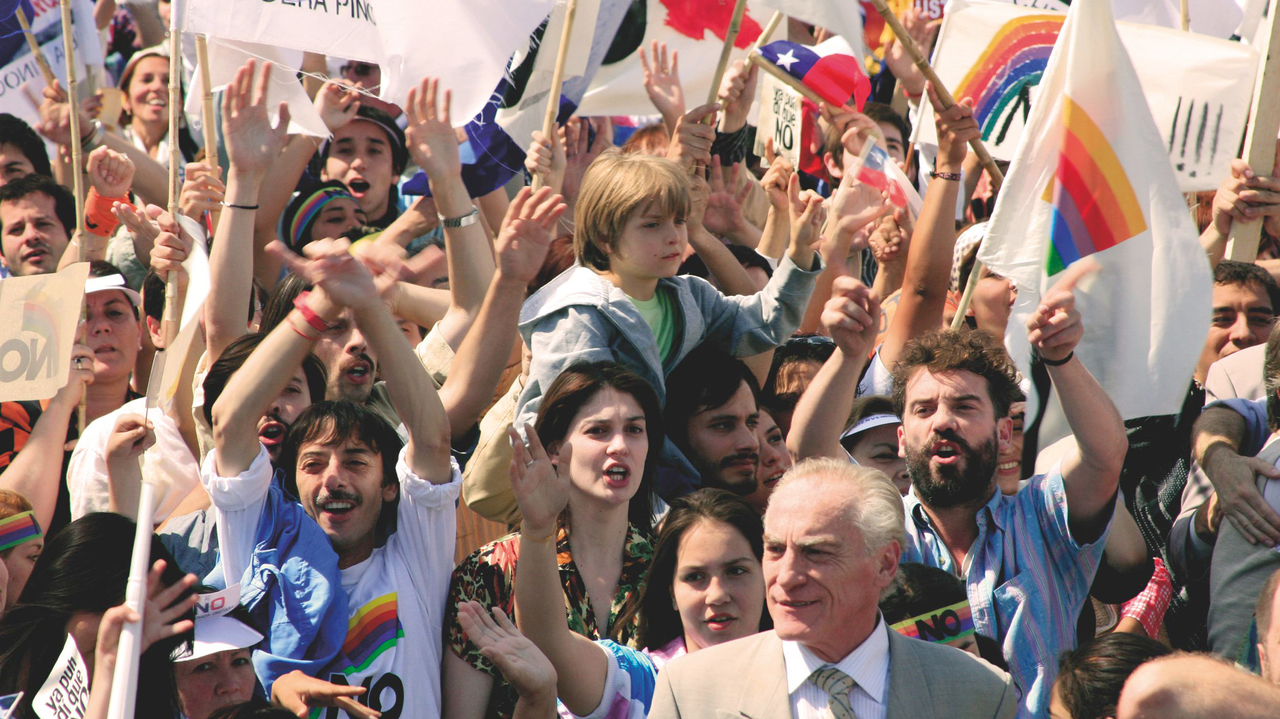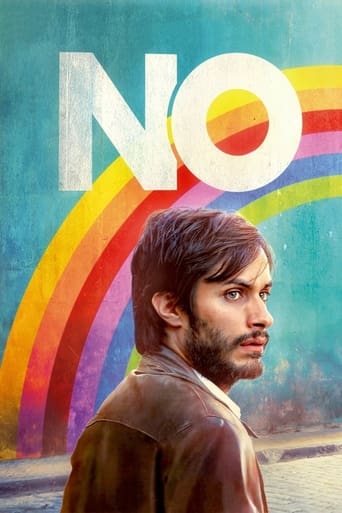

In 1988, fifteen years into his reign as President of Chile, General Augusto Pinochet agreed to allow the people of his nation to hold a national referendum, leaving it up to them to determine whether or not they wanted him to remain as their leader for another eight years. On the surface, this might have seemed like a turn toward democracy for a man who came to power as a result of a military coup and who ruled his nation with an iron fist - sending many dissidents to prison and to their deaths - but many who were opposed to him eyed the elections with a great deal of skepticism and distrust, believing that the vote would be rigged and that his preordained victory would only further strengthen his grip on power and, simultaneously, enhance his image in the eyes of the world.But hold the election the nation did, and it is against this backdrop that the movie "No" is set. Gael Garcia Bernal stars as Rene Saavedra, a divorced advertising executive who lives a profitable and comfortable life with his young son, Simon. Hitherto, he has remained largely apolitical in a country where to voice an opinion on the government or its leaders can put one's own life and freedom in jeopardy (his ex is herself a leftist activist who often finds herself abused and imprisoned for her actions). But when the plebiscite is announced, Rene, somewhat hesitantly at first, agrees to work for the No Campaign, bringing his expertise on advertising for the first time into the realm of politics.While most of the people involved in the campaign want to take this opportunity to expose the horrors of the regime through a hard-hitting series of 15-minute ads, Rene argues instead for a more upbeat, feel-good approach on the theory that people are more likely to respond positively to something that makes them feel happy than something that makes them feel outraged or depressed. The result is a series of TV spots so impossibly bland and innocuous - filled with deliriously happy performers dancing and singing a jingle - that they might as well be selling toothpaste. And I guess that's one of the points of "No" - that in a consumer-conscious society even freedom and democracy eventually become commodities like everything else and can be sold as such.Written by Pedro Peirano and directed by Pablo Larrain, "No" is of more interest as a historical and social document than as a drama, since its characters remain largely superficial throughout. And while the narrative earns points for resisting the temptation to overdramatize an already highly volatile situation, the perhaps inevitable price of that restraint is a picture that actually feels UNDER-dramatized at times. However, the bravery of these individuals in the face of some obvious attempts at intimidation does shine through. In order to more seamlessly blend the action of the story with actual archival footage from the era in which it's set, the movie has been given a deliberately grainy, over-lit appearance by cinematographer Sergio Armstrong that helps to heighten its authenticity.Not quite as emotionally powerful as one might wish it to be, "No" is, nevertheless, a true-life tale of a national uprising well worth paying heed to.
... View MoreThis is the essence of cinema. The story is really involving and the director uses the best tools to show it in a theater.What is more, at the beginning I was thinking this movie is naive, but the last two scenes makes it something even similar to Orwell books.It is also really important because at the general stage it a movie about the reasons which drives people to do something. We usually think that some easy slogans like "freedom" are the ones we should fight for. But this movie shows they are only slogans... Great movie to discuss. Makes you think about the mechanisms of getting power.
... View More"No" is a film that was nominated for the Oscar for Best Foreign Language Film. Perhaps I am wrong, but I wonder if most of this nomination is because of the subject matter, as the peaceful ouster of Pinochet was a wonderful things--and few would disagree with this. However, as for the movie itself, I was shocked how uninteresting it was, as the film lacked energy and, more importantly, emotion. This is really surprising because you'd expect a lot of tears and a lot of anger, as the Pinochet regime was responsible for many atrocities and human rights violations--and you'd THINK this would come through in the film. Instead, much of the film, especially the first half, was plodding and bereft of feeling. Where is the anger?!?! Fortunately, the film did get better in the second half when agents of Pinochet tried to intimidate the opposition...but still I expected so much more.Overall, this film is mildly interesting but should have been a lot better. For a better look at the Pinochet administration, try watching the three "Battle of Chile" films. Additionally, for a better film that is critical of repression in South America, try the Oscar-winning "The Official Story"--a film that has heart, emotion and is much harder-hitting in the way it addresses the fall of the Argentinian regime.
... View More"Faith is what will change Chile." Saavedra (Gail Garcia Bernal)1988 was not a good year for August Pinochet, the dictator of Chile: after 16 years, he agrees to a referendum that simplified the topic by having the electorate vote either "Yes" or "No" for his rule. One of the reasons he lost, notwithstanding the number of murdered or vanished enemies, was adman Renee Saavedra (Bernal), the brains behind the commercial for soft drink "Free," featuring mimes and rock musicians among other images.While this docudrama gives an effective perspective on the fall of a tyrant, it also shows the successful inside working of an ad firm, which seemed not to have a chance given the perception that Pinochet had a lock on the election process. Not so. It's instructive to see how much Saavedra's belief in selling the upbeat emotion of the soda makes a difference in the final outcome, and that good does sometime overcome evil.One of the more successful aspects of the film is its use of vintage video cameras, which allows the director to smoothly incorporate original TV commercials and news footage. In other words, No is an enjoyable thrust back into history, as good a look at the underside of Latino politics and propaganda as you will ever see.
... View More